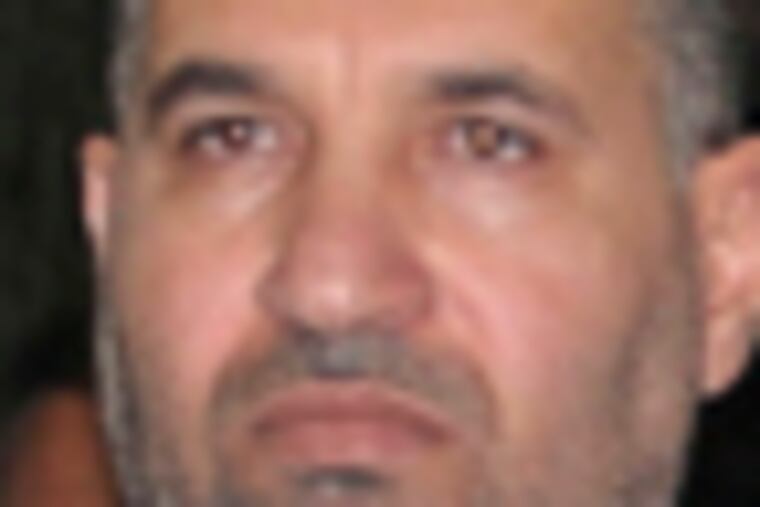Israel kills a Hamas leader
Its military warned of more retaliatory attacks on Gaza.

GAZA CITY, Gaza Strip - Israel killed the commander of the Hamas military wing in one of about 20 air strikes along the Gaza Strip on Wednesday, the worst barrage on the Palestinian territory in four years in retaliation for renewed rocket fire on southern Israel. Gaza's health minister said 10 people were killed, including two young children.
The Israeli military said it was the beginning of a major offensive and warned it could escalate with a ground attack.
"All options are on the table. If necessary, the [Israeli military] is ready to initiate a ground operation in Gaza," it said.
In response to the assassination, Egypt recalled its ambassador to Israel.
In a statement read on state TV late Wednesday, spokesman Yasser Ali said Egyptian President Mohammed Morsi recalled the ambassador and asked the Arab League's secretary general to convene an emergency ministerial meeting.
Morsi also called for an immediate cease fire between Israel and Hamas, an offshoot of Morsi's Muslim Brotherhood.
The killing of Ahmad Jabari marked a dramatic resumption of Israel's policy of assassinating Palestinian militant leaders. He was the most senior Hamas official to be killed since the last war in Gaza ended in early 2009. He has long topped Israel's most-wanted list, blamed for a string of deadly attacks, including the kidnapping of Israeli soldier Gilad Shalit in 2006.
The offensive followed a weekend exchange of rocket fire from Gaza on southern Israel followed by Israeli air strikes. Seven Palestinians were killed and several Israelis were wounded.
The military said its aircraft targeted more than 20 facilities that served as storage or launching sites for rockets. Among the weapons destroyed were rockets that could hit as deep as 25 miles into Israel.
Plumes of black smoke wafted into Gaza City's skies after at least five air strikes there. Sirens blared as people ran in panic in the streets and militants fired angrily into the air. Hamas police cordoned off the area around a hospital where at least one body from the strike was taken.
Gaza Health Minister Mufeed Mkhallalati said 10 people were killed, including Jabari, and 45 wounded, 10 critically. Among the dead were three civilians, including an 11-month-old and a 6-year-old.
Palestinians called for harsh retaliation. Hamas, which rules Gaza, announced a state of emergency in the territory and evacuated all its security buildings.
Outside the hospital where Jabari's body was taken, Hamas official Khalil al-Haya eulogized the commander and threatened Israel.
"The battle between us and the occupation is open and it will end only with the liberation of Palestine and Jerusalem," he said.
Witnesses said Jabari was traveling in a vehicle in Gaza City when the car exploded. Crowds of people and security personnel rushed to the scene of the strike, trying to put out the fire that had engulfed the car and left it a charred shell. The Israeli military released a grainy, black-and-white video of the air strike. It shows a sedan moving slowly along a road before exploding in a powerful blast that sent a large piece of the car into the air.
Fearing a long war in Gaza, Palestinians rushed to buy fuel, bread, and other food supplies.
"We are working under fire to protect our people and to back the resistance," said Islam Shahwan, a Hamas interior ministry spokesman. "We have a full emergency plan that we are adopting now."
Israeli Prime Minister Benjamin Netanyahu was meeting with his senior security cabinet after sundown, officials said.
The chief military spokesman, Brig. Gen. Yoav Mordechai, said there were no plans for a ground offensive "at this stage. We're focusing on an air operation," he said.
The military said the assassination was just the beginning of an operation codenamed "Pillar of Defense."
"After a couple of days on ongoing rocket attacks toward Israeli civilians, the [Israeli military] chief of staff has authorized to open an operation against terror targets in the Gaza Strip," military spokeswoman Lt. Col. Avital Leibovitch said.
She said that Jabari had "a lot of blood on his hands" and that the military chief "authorized different targets" as well.
Advocates say targeted killings are an effective deterrent without the complications associated with a ground operation, chiefly civilian and Israeli troop casualties. Proponents argue they also prevent future attacks by removing their masterminds.
Critics say the killings invite retaliation by militants and encourage them to try to assassinate Israeli leaders. They complain that the strikes amount to extrajudicial killings.